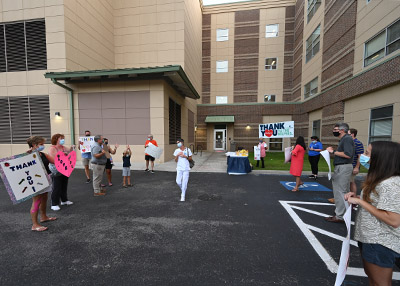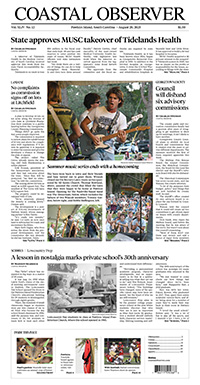Health
State approves MUSC takeover of Tidelands Health

A takeover of Tidelands Health by the Medical University of South Carolina received approval this week from the state Fiscal Accountability Authority.
Tidelands is on track to lose $50 million in the fiscal year that ends Sept. 30 and has cash reserves to cover another two years of losses, MUSC Health officials told state lawmakers last week.
“We think there are a variety of things we can do to help strengthen them financially and then turn them around fiscally,” Patrick Cawley, chief executive of the state-owned Medical University Health Authority, told legislators last week when the takeover received approval from the legislature’s Joint Bond Review Committee.
The approvals from the committee and the fiscal authority are required by state law.
Tidelands Health, as it has been known since 2014, began as Georgetown Memorial Hospital in 1950. In addition to the 145-bed hospital in Georgetown, it owns the 124-bed Waccamaw Community Hospital and rehabilitation hospitals in Murrells Inlet and Little River. It has approval to build a 36-bed hospital in Socastee.
MUSC Health acquired a 30 percent interest in the nonprofit Tidelands system in 2020, but has no claims on the profits or responsibility for the losses, according to filings with the state. It now plans to take a majority interest, although the exact percentage was not specified.
Rep. Bruce Bannister confirmed that MUSC would take on Tidelands debt once it has a controlling interest.
“That would be a liability of MUSC,” Cawley said. “We feel pretty good about the situation and feel the plan to get them on the right path is solid.”
Tidelands’ annual report last year showed it had an operating loss of $22.7 million on revenue of $537.8 million. MUSC, which includes the university and the health care system, has a budget for the coming year of $8.3 billion.
Cawley told lawmakers that the takeover has been “kind of swirling as a potential idea” for several months. The Tidelands board, which Cawley and five others from MUSC serve on, “wanted to move forward with,” he said.
In a statement, Tidelands Health called the acquisition “an expanded partnership.”
“Many details, including the increased governance amount, are still being negotiated. Tidelands Health and MUSC Health would remain separate organizations,” according to the statement.
n
Local lawmakers say they support the acquisition.
“MUSC is a leader in health care in the state,” Rep. Lee Hewitt said. He chairs the medical subcommittee of the House Ways and Means Committee. “I don’t see any downside to it other than the control, the decisions will be made by MUSC.”
Once the deal is completed, “you will see everything rebranded,” Hewitt said.
He has been touring health care facilities around the state as part of his subcommittee work. He was at Tidelands last week with federal officials responsible for Medicare funding. He was at MUSC this week.
“I was aware that these discussions were going on,” Hewitt said. “I felt it was going to happen.”
Sen. Stephen Goldfinch was approached by MUSC four or five months ago about the deal. “They confirmed what I had been hearing,” he said. “Bankruptcy was their word.”
He was initially skeptical.
“I had concerns about a government-support health system gobbling up a nonprofit system with public dollars,” Goldfinch said.
He was told that MUSC Health isn’t paying cash for Tidelands, just acquiring its assets and liabilities. The approval from the Joint Bond Review Committee requires “immediate notice in the event that any cash consideration is made by the Authority in support of the transaction in the first 5 years of the agreement.”
MUSC Health wants to complete the takeover by the end of September, Goldfinch said. “It feels a little ambitious to me,” he added.
Cawley told the bond committee last week that MUSC Health’s ties with Tidelands will made the change easier.
“From our review, they would have somewhere around two years of cash reserves, which to us tells us we’ve got about two years to turn this around,” Cawley said. “We have picked up many other distressed hospitals in the past and turned all of them around.”
The $50 million loss at Tidelands would be the second highest among those hospitals, he told the committee.
Rep. Gilda Cobb-Hunter, who serves on the bond committee and is Hewitt’s seatmate in the House, said MUSC Health did all that it promised after taking over the hospital in Orangeburg. It added specialty care that meant patients no longer had to go to Charleston.
“It has been a great partnership,” she said.
“And we didn’t know Orangeburg as well,” Cawley said.
It had a $30 million deficit and the turnaround took two years.
“Tidelands has over $140 million of unrestricted cash in reserves and investments, so they’ve got a fair safety net,” Doug Lishke, the chief financial officer for MUSC Health, told the bond committee. “We’re very confident we’re going to turn that around very quickly.”
MUSC’s plan for reducing costs and adding services at Tidelands convinced Goldfinch that it can be done without major job losses to Georgetown County’s largest employer.
“They convinced me that most people in the Tidelands system would keep their jobs,” he said. “I have high hopes for the MUSC merger.”
Goldfinch also said MUSC agreed to maintain local representation on the Tidelands board, allowing the county legislative delegation “informal advise and consent” on its members.
The situation in Georgetown County is not as bad as Hewitt has seen elsewhere in the state. He expects the county to get $50 million over five years in federal funding to aid rural hospitals, but he said that even with that the state is projecting that it will have a shortage of 3,000 doctors next year.
“On the Waccamaw Neck, we’re short of doctors, but we do have access to quality health care,” Hewitt said, adding that the MUSC deal will mean more in the rural areas of the county. “Tidelands quit delivering babies in Georgetown. Will that come back? You would hope so.”




